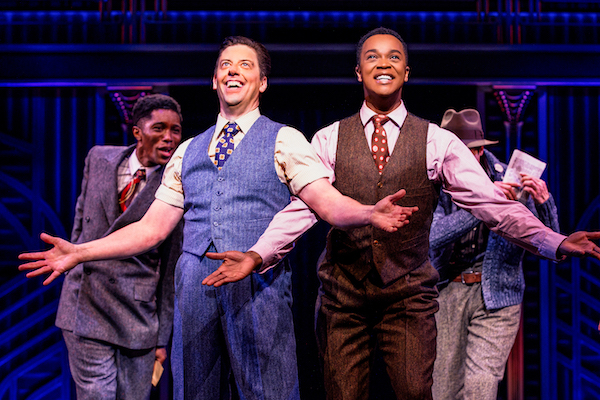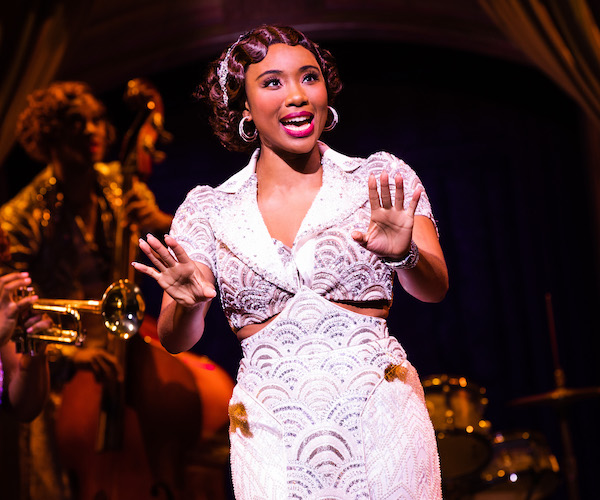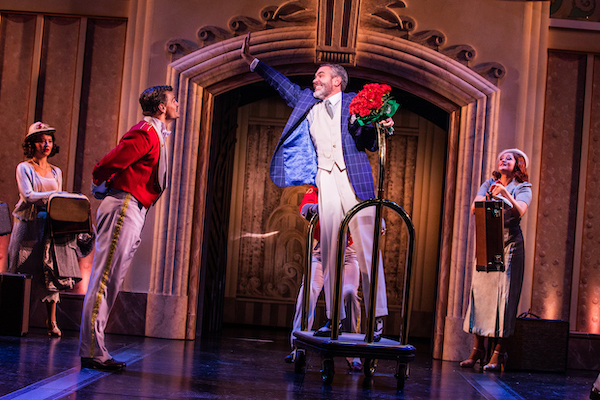Theater Review: The Proudly Woke “Some Like It Hot” Musical Is a Genuine Blast
By Christopher Caggiano
Some Like It Hot is a terrifically entertaining — and thoroughly modern — reinvention of the classic Hollywood comedy.

(l to r): Christian Borle and J. Harrison Ghee in Some Like it Hot. Photo credit: Marc J. Franklin
Broadway has had an unusual number of new musicals so far this season. Musicals typically pile up in March and April, right before the Tony deadline. But this season we had no fewer than six new musicals (Almost Famous, KPOP, & Juliet, Kimberly Akimbo, A Beautiful Noise, and Some Like It Hot) and one revival (Into the Woods) before the new year, which doesn’t happen that much.
However, the attrition has already started. KPOP died a rather quick death and Almost Famous recently announced it would be closing in January. Of the rest, A Beautiful Noise and & Juliet are middling jukebox tuners, although they seem to be attracting decent crowds, at least for now. Hopefully, Kimberly Akimbo, easily the best musical of the lot, will be able to hold on through the notoriously difficult winter months and gain some momentum when it picks up what will likely be a raft of Tony Awards. (Read my review of the Off-Broadway production.)
Another significant standout this season has been the joyous and tuneful Some Like It Hot (at the Shubert Theatre, 225 West 44th Street). The show took me by surprise. I wasn’t really expecting much from composer/lyricist Marc Shaiman and lyricist Scott Whitman. After the instantly forgettable Catch Me If You Can and the unforgettably awful Charlie and the Chocolate Factory, it was beginning to look like the Hairspray duo were going to be one-hit wonders.
What’s more, those wishing to musicalize the classic 1959 film Some Like It Hot do so at their peril. The great Jule Styne, Bob Merrill, and Peter Stone learned this with their 1972 flop, Sugar. Also, the film is so iconic, so funny, so absolutely perfect as it is, you’d be justified in thinking that there really isn’t anything that a musical version could add to it.
And that’s the miracle of the new Some Like It Hot musical. It takes the admittedly formidable original in new and legitimate directions and creates a stand-alone piece that’s almost as funny and, in its own way, just as enjoyable.

Adrianna Hicks in Some Like It Hot. Photo: Marc J. Franklin
What Shaiman and Whitman have done, in tandem with librettists Amber Ruffin (comedian and writer on Late Night with Seth Meyers) and Matthew López (Tony-winner for the lauded but short-lived The Inheritance), is to concoct a good old-fashioned musical comedy, but with a decidedly modern sensibility.
The film, of course, is about two Jazz Age musicians who witness a Chicago mob hit and hide out by donning women’s clothes and joining an all-female orchestra. The musical keeps this basic framework but adds themes of race and gender identity. The racial overtones add layers to the characters and depth to the story, although the gender fluidity material almost crosses the line into Harvey Fierstein-esque preachiness.
At the center of both the movie and the musical is the character of Sugar Kane, the lead singer for the all-female band, played in the film by the legendary Marylin Monroe. The Sugar character is now Black, as is the Jerry/Daphne character, the bass-playing member of the central cross-dressing pair, indelibly played by Jack Lemmon in the film. The racial shifts give resonance to numerous moments in the score and the book that address the issues of being Black in the ’30s: getting hired at a historically all-white nightclub, seeking fame in a starkly segregated Hollywood.
[Warning: Plot spoilers ahead. But if you’ve seen the movie, the musical ends very similarly.]
Slightly more problematic is the plot shift that has Jerry/Daphne embracing gender fluidity. Living life as a woman initiates a personal discovery in Jerry, who embraces Daphne as “the best part of me.” This of course, is wonderful, and entirely in keeping with modern sensibilities. But the show is a bit blithe about the long-term prospects for a gender-fluid person of color being “married” to a white man in ’30s America.
But, somehow, the wondrous J. Harrison Ghee makes you believe that all will be well for Jerry/Daphne. Ghee is absolutely mesmerizing in the role, quite literally in the sense that I found I couldn’t take my eyes off him, even when he wasn’t the focus of the scene. He’s just that generous a performer, always giving his scene partners plenty to work with. I loved watching Ghee’s reactions to the peculiar but adorable Kevin Del Aguila as Osgood. I could actually see Daphne falling in love with Osgood over the course of “Fly, Mariposa, Fly,” Osgood’s second-act solo. Ghee is not only a dynamic performer, but he’s also one of those rare thespians who helps make the other people look good.
Adrianna Hicks — lately Catherine of Aragon in Broadway’s Six — has a knockout voice and makes for a very sympathetic Sugar. But she doesn’t steal the show, as Sugar really should. Perhaps it’s not really Hicks’s fault. In making the Sugar character more self-determined, the librettists have somehow made her a lot more bland, a liability that Hicks continually struggles to overcome.
Again, Shaiman’s score here is catchy, bouncy, and memorable. If the ’30s homage sometimes crosses over from pastiche into parody, the music is nonetheless enjoyable throughout. The lyrics, however, fall into the same old patterns of Shaiman and Whitman. They’re dense, chewy, and often unintelligible; in fact, they are so jam-packed it was hard to figure out most of the time what the singers were actually saying. Regardless, the songs somehow get their exuberant point across.

Kevin Del Aguila and the cast of Some Like It Hot. Photo: Marc J. Franklin
Even when you can understand the lyrics, it doesn’t really matter. The songs too often fall into the lazy Phantom of the Opera song formula: the oft-repeated title expresses the sentiment of the song, and the rest of the lyrics are just variations on that theme. With Shaiman and Whiteman, there’s often no progression in the songs, no journey for the performer to evince. Think of the finale from Hairspray, “You Can’t Stop the Beat.” Does anyone in the audience actually remember anything from that song beyond the title? The lyric is basically just a catalog of things you can’t stop.
In this sense, the songs for Some Like It Hot are very much like those from ’30s movie musicals, and I don’t mean that as a compliment. Songs from that era’s movies were almost universally generic and noncontextual. There’s a reason those old standards can pop up in all those George Gershwin and Irving Berlin songbook shows. The lyrics aren’t specifically tailored to the situation in the movie plot and are thus easily transportable.
To their credit, Shaiman and Whiteman do manage to keep the songs relevant to the plot, even when the songs are diegetic — i.e., being performed by and with the onstage band. In fact, one of the most skillful aspects of the score and the show in general is the ease with which the songs flow from performative to introspective and back again.
Despite its flaws, Some Like It Hot gives audience members a grand old time, while also giving them something to think about while humming the insidiously catchy title number as they file out of the theater. Director/choreographer Casey Nicholaw whips all the elements up together into an eminently entertaining whole. He creates an honest-to-God showstopper for the big running-from-the-gangsters chase at the end of the show. Entitled, “Tip Tap Trouble,” this number is a wonder of staging, pacing, and crowd control. It received a thunderous ovation both times I saw the show.
Like most of the new musicals this season, Some Like It Hot has been struggling to gain traction at the box office. Hopefully, as harsh postpandemic economics force weaker shows to close, things will pick up at the Shubert and make Some Like It Hot the feel-good hit it deserves to be.
Christopher Caggiano is a freelance writer and editor living in Boston. He has written about theater for a variety of outlets, including TheaterMania.com, American Theatre, and Dramatics magazine. He also taught musical-theater history for 16 years and is working on numerous book projects based on his research.

This number alone sells the show, I’d say –
https://www.youtube.com/watch?v=SSXBXXinMGQ
Oh, yeah. The title number is remarkably infectious. Here’s the Macy’s parade version is you want to see some of Casey Nicholaw’s energetic dance:
https://www.youtube.com/watch?v=Zk8EEtPY4ak
Thank you for this well thought out description of this beautiful show. I have seen it numerous times and there are still sections of lyrics that I can’t decipher (especially when sung by the ensemble); now I know it’s not just my imperfect hearing that’s the problem. But as you say, it doesn’t really matter since there are greater forces at play here that sweep the audience along.
J. Harrison Ghee emerges as a most incandescent star, though Christian Borle is also doing the best work of his career. How the show gently unfolds and pulls the audience in is a wonder.
I hope Some Like It Hot runs forever.
Wonderful observations and eloquently put. I just saw the show for the third time this week, and it definitely holds up to repeat viewings. The flaws remain, but overall it’s just such a joy.
I’m definitely rooting for this one to make it past the winter blahs. It deserves a long and healthy run.
Making it woke and making it about a man finding out he is really transgender ruins the show completely..absurd…sentimental instead of astringent and ambiguous..nothing to admire..you think it’s progressive but it is mediocre and regressive.